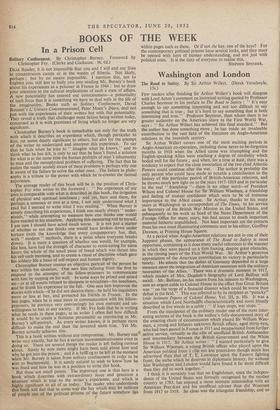BOOKS OF THE WEEK
In a Prison Cell
Solitary Confinement. By Christopher Burney. Foreword by Christopher Fry. (Clerke and Cockeran. 91. 6d.) DEAR Reader, it is not impossible that you and I will end our lives in concentration camps or in the wastes of Siberia. Not likely, perhaps ; but by no means impossible. I mention this, not to frighten you, still less to bully you into reading Mr. Burney's book about his experiences as a prisoner in France in 1944: but to draw your attention to the cultural implications of such a state of affairs. A new potentiality has entered our consciousness—a potentiality of such force that it is something we have to deal with in the life of the imagination. Books such as Solitary Confinement, David Rousset's L' Univers Coneentrationnel, Peter Moen's Diary, deal not just with the experiences of their writers but with this potentiality. They reveal a truth. that challenges most fiction being written today, concerned as it is with premisses of living which no longer are very significant.
Christopher Burney's book is remarkable not only for the truth with which it describes an experience which, though particular to him, yet seems deeply significant to others, but also for the attempt of the writer to understand and interpret this experience. To say that he fails when he Aries to " imagine what he knows," and to think what he has felt, is only to say that he hasn't found a solution for what is at the same time the human problem of man's inhumanity to man and the metaphysical problem of suffering. The fact that he makes the reader acutely aware of these problems is perhaps why one is aware of his failure to solve the other ones. The failure in philo- sophy is a tribute to the power with which he re-creates the factual experience. The average reader of this book will be in the position of Chris- topher Fry who writes in the foreword : " No experience of my own is comparable with what is described in this book, the irrigation of physical and spiritual loneliness ; and yet, here and there, for perhaps a sentence or two at a time, I not only understood what I read but I seemed to write what I was reading." When Burney is simply describing his experiences, 1 think one nearly always " under- stands," while attempting to measure how one thinks one would have reacted in his situation. Applying this measuring rod to myself, I am sure I should have acted much worse. It is not just a matter of whether or not one thinks one would have broken down under torture (with the knowledge that every contemporary has, that, with " modern " methods, there is a point where everyone breaks down). It is more a question of whether one would, for example, like him, have had the strength of character to resist-eating for some hours the whole of the small piece of bread which was thrust into his cell each morning, and to create a ritual of discipline which gave his solitary life a basis of self-respect and human dignity.
Christopher Burney creates an objective portrait of the person he was within his situation. One sees him refusing from the first to respond to the attempts of his fellow-prisoners to communicate with him by tapping on his wall. In some ways he prized and seized on—or at all events refused to dissipate in trivialities—his loneliness, and he drank his experience to the full. One sees him improvise the stories with which—if he did not deceive them—he held his inquisitors more or less at bay, and protected his friends in France. In the last pages, when he is once more in communication with his fellow- prisoners, he portrays very convincingly his own restraint and un- willingness to mix in any society. If Mr. Fry feels that he is writing what he reads in these pages, as as writer I often. feel how difficult It would In to create a fictitious personality as convincing as Mr. Burney's self-portrait. As every- writer knows, it is perhaps more difficult to make the real than the invented seem true. Yet Mr. Burney actually achieves this. This is a book written without any compromise. Mr. Burney cane write.very exactly, but he has a certain incommunicativeness even in doing so. There are several things the reader is left feeling curious about. Surely by now more might have been told about how and why he got into the prison ; and it is belling to be left at the moment when Mr. Burney is taken from solitary confinement in order to be sent to Buchenwald. It is surely natural to wish to know'how he was freed and how he was in a position to write this book.
But these are small points. The important one is that here is a book which describes with extraordinary force and precision a situation which is true to the writer's experience, and which is highly significant to all of us today. The reader who understands this book will feel that in some- way the key which "may let millions of people out of the political prisons of the future somehow lies ti
within pages such as these. Or if not the key, one of the keys? For the contemporary political prisons have several locks, and they must be opened with keys of human understanding, and not just with political ones. It is the duty of everyone to realise this.
STEPHEN SPENDER.


















































 Previous page
Previous page